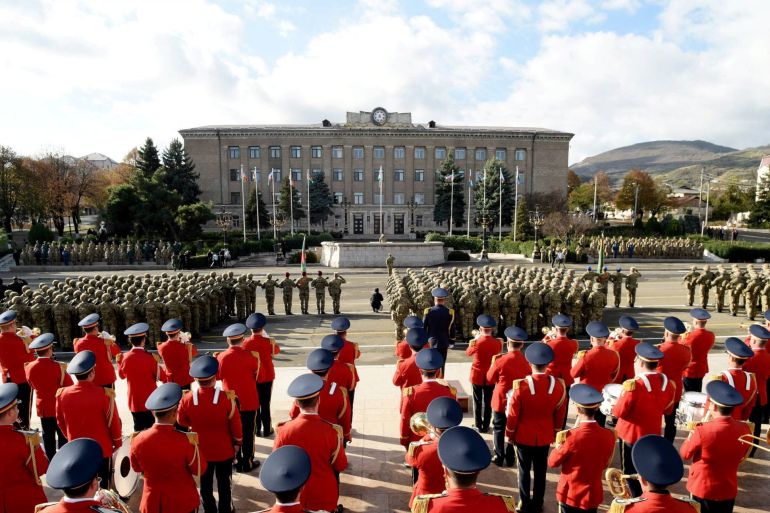Armenia, Azerbaijan agree to take steps towards normalisation
EU and US welcome joint statement in which two sides agree to exchange prisoners of war and Armenia backs Azerbaijan COP29 bid.

Armenia and Azerbaijan have said they will exchange prisoners of war and work towards normalising their relations, in a move welcomed by the European Union and the United States.
The two countries have been locked in a decades-long conflict over Nagorno-Karabakh, which Azerbaijan reclaimed after a lightning offensive against Armenian separatists in September.
Keep reading
list of 4 itemsAzerbaijan arrests two journalists investigating political corruption
Azerbaijan must let ethnic Armenians return to Nagorno-Karabakh: UN court
Armenian PM hopes for peace deal with Azerbaijan ‘in the coming months’
In a joint statement issued late on Thursday night, the two sides said they had agreed to seize “a historical chance to achieve a long-awaited peace in the region” and hoped to sign a peace treaty before the end of the year.
“The two countries reconfirm their intention to normalise relations and to reach the peace treaty on the basis of respect for the principles of sovereignty and territorial integrity,” the statement added.
September’s Azerbaijani offensive in Nagorno-Karabakh ended ethnic Armenians’ three decades of rule of the territory and led most of its 120,000 residents to flee the region, which is internationally recognised as part of Azerbaijan.
Until Thursday’s announcement, the two countries had argued bitterly on the outline of a peace process amid mutual distrust.
The statement said Baku will free 32 Armenian prisoners of war, while Yerevan will release two Azerbaijani servicemen, in agreements reached during talks between the office of Armenian Prime Minister Nikol Pashinyan and the administration of Azerbaijan President Ilham Aliyev.
The two countries also said they “will continue their discussions regarding the implementation of more confidence-building measures, effective in the near future, and call on the international community to support their efforts”.
Armenia’s foreign ministry said Yerevan had “responded positively to the offer of US Secretary of State Antony Blinken to organise the meeting of the foreign ministers of Armenia and Azerbaijan in Washington”.
European Council President Charles Michel described the developments as a “major breakthrough in Armenia-Azerbaijan relations” while the US welcomed the statement and the prisoner exchange.
“This commitment represents an important confidence-building measure as the sides work to finalise a peace agreement and normalise relations,” State Department spokesman Matthew Miller said in a statement.
As part of the deal, Armenia also agreed to lift its objections to Azerbaijan hosting next year’s international conference on climate change.
Countries had been unable to agree on an eastern European host for the 2024 climate talks, with Russia vetoing countries in the EU and Azerbaijan and Armenia rejecting each others’ bids. A decision on the meeting’s location and presidency is due within the next week.
The joint statement said that “the Republic of Armenia supports the bid of the Republic of Azerbaijan to host the 29th Session of the Conference of Parties [COP29] to the UN Framework Convention on Climate Change, by withdrawing its own candidacy”.
Aliyev and Pashinyan have met on several occasions for EU-mediated normalisation talks, but the process had stalled over the last two months as two rounds of negotiations failed to take place.
Azerbaijan had refused to participate in talks with Armenia that were planned in the US on November 20, over what it said was Washington’s “biased” position.
In October, Aliyev declined to attend a round of negotiations with Pashinyan in Spain, that time accusing France of bias.
French President Emmanuel Macron and German Chancellor Olaf Scholz had been scheduled to join Michel as mediators at those talks.
Armenia and Azerbaijan have been at odds for more than three decades over Nagorno-Karabakh, which freed itself from Baku’s control in a bloody ethnic conflict that accompanied the 1991 collapse of the Soviet Union, surviving with financial, military and diplomatic support from Yerevan.
A second war erupted in 2020 before Azerbaijan’s September 19 attack led Armenian separatists to lay down their arms after just a single day of fighting.